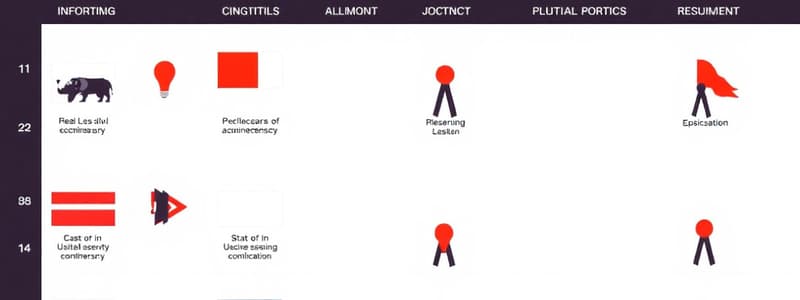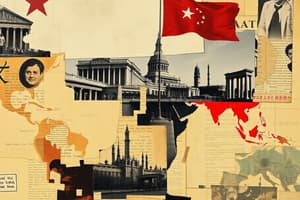Podcast
Questions and Answers
What does realism emphasize in international relations?
What does realism emphasize in international relations?
- The role of international institutions
- The influence of social constructs
- The importance of cultural influence
- The competitive and conflictual nature (correct)
Which theory of international relations highlights the importance of democracy and economic interdependence?
Which theory of international relations highlights the importance of democracy and economic interdependence?
- Marxism
- Liberalism (correct)
- Realism
- Constructivism
What is meant by 'sovereignty' in the context of international relations?
What is meant by 'sovereignty' in the context of international relations?
- The establishment of international laws
- The interaction between non-state actors
- The authority of a state to govern itself (correct)
- The ability to influence global markets
How is power typically categorized in international relations?
How is power typically categorized in international relations?
What are multinational corporations (MNCs) significant for in international relations?
What are multinational corporations (MNCs) significant for in international relations?
Which current issue in international relations poses a significant threat from non-state actors?
Which current issue in international relations poses a significant threat from non-state actors?
What methods of analysis involve statistical analyses and modeling in international relations?
What methods of analysis involve statistical analyses and modeling in international relations?
Which future trend in international relations is characterized by increasing nationalistic sentiments?
Which future trend in international relations is characterized by increasing nationalistic sentiments?
Flashcards are hidden until you start studying
Study Notes
Political Science: International Relations
-
Definition: The study of interactions between states and non-state actors in the international system. It focuses on political, economic, and social relations.
-
Key Theories:
- Realism: Emphasizes the competitive and conflictual side of international relations. States are seen as rational actors prioritizing national interest and power.
- Liberalism: Focuses on cooperation among states and the role of international institutions in fostering peace and stability. Highlights the importance of democracy, economic interdependence, and international law.
- Constructivism: Examines how social constructs, identities, and norms shape international relations. Argues that state behavior is influenced by identities and context rather than just material interests.
-
Important Concepts:
- Sovereignty: The authority of a state to govern itself without external interference.
- Power: The ability of a state to influence others, often categorized into hard power (military and economic capabilities) and soft power (cultural and ideological influence).
- Global Governance: Institutions and processes that manage global affairs, including international organizations (e.g., UN, NATO) and treaties.
-
Key Actors:
- States: Primary actors with sovereignty; engage in diplomacy, conflict, and cooperation.
- International Organizations: Entities formed by states to address global issues (e.g., UN, EU).
- Non-Governmental Organizations (NGOs): Influence international policies and humanitarian efforts (e.g., Amnesty International).
- Multinational Corporations (MNCs): Play a significant role in global economics and politics.
-
Current Issues in International Relations:
- Globalization: Its impact on state sovereignty and economic interdependence.
- Terrorism: Threats posed by non-state actors and responses by states.
- Climate Change: International cooperation essential for addressing environmental challenges.
- Great Power Rivalry: Increasing tensions among major powers (e.g., US, China, Russia).
-
Methods of Analysis:
- Qualitative Methods: Case studies, interviews, and historical analysis to examine international phenomena.
- Quantitative Methods: Statistical analyses and modeling to understand patterns and trends in international relations.
-
Future Trends:
- Rise of populism and nationalism affecting international cooperation.
- Increasing importance of cyber security and technology in global politics.
- The role of regional powers in shaping global dynamics.
International Relations
- Definition: Study of interactions between states and non-state actors in the international system. Focuses on political, economic, and social relations in the global sphere.
Key Theories
- Realism: Emphasis on competition and conflict between states. States are rational actors pursuing their primary goals, primarily focused on national security and power.
- Liberalism: Emphasizes cooperation between states and the role of international institutions in achieving peace and stability. Recognizes the importance of democracy, economic interdependence, and international law in promoting peaceful relations.
- Constructivism: Examines how social constructs, identities, and norms shape state behavior and the international system. State behavior is influenced by shared values, norms, and ideologies, not just material interests.
Important Concepts
- Sovereignty: A state's right to govern itself without external interference. This is a fundamental principle of international relations.
- Power: The ability of a state to influence the actions of others. This is often categorized as "hard power" (military and economic might) and "soft power" (cultural and ideological influence).
- Global Governance: The institutions and processes managing global affairs, including international organizations (like the UN and NATO) and treaties. This encompasses a wide range of activities, from international trade to environmental protection.
Key Actors
- States: Central actors in international relations, possessing sovereignty. They engage in diplomacy, conflict, and cooperation to achieve their national interests.
- International Organizations: Intergovernmental entities established by states to tackle global issues. Examples include the UN, EU, and NATO.
- Non-Governmental Organizations (NGOs): Non-state actors that impact international policy and humanitarian efforts. Examples include Amnesty International and Doctors Without Borders.
- Multinational Corporations (MNCs): International companies that play a crucial role in global economics and politics due to their large size and global reach.
Current Issues in International Relations
- Globalization: The interconnectedness of countries through trade, technology, and culture. It impacts state sovereignty and presents challenges in regulating its effects.
- Terrorism: The threat posed to states and societies by non-state actors who employ violence to achieve political goals. It requires states to balance security measures with respect for international law.
- Climate Change: A global issue that requires international cooperation for effective solutions. It presents challenges for coordinating policies and mobilizing resources to address its effects.
- Great Power Rivalry: The increasing tensions and competition between major powers, such as the United States, China, and Russia. This can lead to conflict, instability, and a reshaping of the balance of power.
Methods of Analysis
- Qualitative Methods: In-depth case studies, interviews, and historical analysis to understand international phenomena. This approach focuses on detailed information in specific contexts.
- Quantitative Methods: Statistical analyses, modeling, and data analysis to understand patterns and trends in international relations. A quantitative approach seeks to identify causal relationships through data and statistical methods.
Future Trends
- Rise of Populism and Nationalism: These trends may disrupt international cooperation and lead to more inward-looking policies, challenging the globalist approach.
- Increasing Importance of Cyber Security and Technology: Technology is becoming more central to international relations, requiring new strategies to manage cybersecurity risks and harness its potential for global cooperation.
- The Role of Regional Powers: Regional powers, like Brazil, India, and Indonesia, are becoming more influential in global affairs and reshaping the balance of power.
Studying That Suits You
Use AI to generate personalized quizzes and flashcards to suit your learning preferences.




